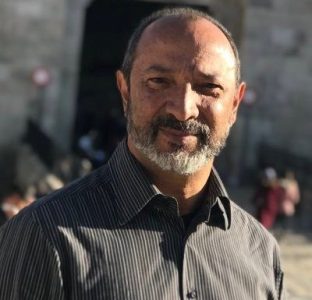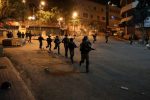Palestine experiences a plethora of daily human rights violations by the Israeli occupation. However the soundtrack of gunshots teargas thrown between homes the armoured jeeps’ doors closing behind detained Palestinians and the violence screaming at us in the form of land annexation and discrimination is not new.
This invasion of brutality and violence into the most intimate places of Palestinians’ life has not only been present from before 1948; it has also been incessantly confronted in revolts and uprisings and even daily by our steadfastness and mere existence.
For today’s young generation in Palestine the story of rebellion and resistance is entrenched in the chronicles of our mothers fathers aunts and uncles as they defied Israeli occupation in the 1980s.
The narrative of the First Intifada is not easily forgotten but despite its importance it is also a story that can seem to be gathering dust on the museum shelf its power diminished by nostalgia and lament.
I often listen to the stories of my grandparents and the feda’yeen of the 50s and 60s while simultaneously collecting the stories of my parent’s generation. The accounts come with a mouthful of references to the muqawimoon (resistors) and munadiloon (strugglers).
The language which comes naturally to the generation of the 1948 Nakba and the generation of the 1987 uprising compared with our new young generation is telling of what has happened to us throughout the years as a Palestinian population.
Feda’ee which stems from the word feda’ in Arabic translates to redemption. The generation of my grandparents fought to redeem the homeland from colonial conquest. Their battles still ring in their ears the scars passed on to their children in the hope that we do not cease seeking justice.
After constant betrayal by the Palestinian leadership coupled with an expanding Zionist project the generation of my parents bred an army of munadiloon which later became muqawama. Al-nidal in Arabic translates to struggle and al-muqawama is resistance. It was the generation that struggled and resisted the Israeli aggression.
Our generation did not grow up with this kind of language save for the few years of the Second Intifada. We are the generation that grew up under the banner of the Oslo Accords the words of normalisation which compromises our rights of “two states” and a plethora of legal terms that we learned at a young age.
Those that continue to mobilise against Israeli aggression are given the titles of activist or human rights defender. This breaks them into a segment exclusive from the rest of Palestinian society. It is a stark contrast to those in the First Intifada and before who were taught the sense of a collective struggle and community.
For Palestinian youth today the First Intifada means more than an echoed chronicle heard through our parents’ generation. It is a testament that if we allow elitist representatives and flawed leadership to speak on our behalf our struggle will be misconstrued and hijacked. Just as happened in 1994 with the signing of the Oslo Accords and its corollaries which not only killed any sense of confrontation but further buried Palestine with a neoliberal capitalism that makes our daily survival completely dependent on Israel.
There are lessons to be learned from the First Intifada. Not only of collective solidarity and mobilisation through all possible fields like art theatre agriculture and more but the fact that if we allow the silencing of the population even for a moment we will lose. The latest declaration by US President Donald Trump to move the US embassy to Jerusalem and recognise the city as the capital of Israel is telling of that.
Thus while the First Intifada is hailed for its grassroots efforts and communal work it is also associated with the failure of leaders to take it and nurture it into the powerful movement that it had the potential to be. This failure bred a new fear in Palestinian youth not only of the Israeli aggression but also of each other accompanied by a growing schism characterised by mistrust.
The resentment amongst youth today towards the Palestinian leadership comes from the sense of betrayal felt by the generation of our parents which is extended to us by their reactions to any new efforts at mobilisation. The older generation is bitterly polemical largely due to having witnessed first-hand not only mass solidarity but also how easily it was taken from them.
A leadership that partook in and were veterans of the First Intifada continues to monopolise the history of their resistance while not bringing any genuine results for Palestinians.
The First Intifada offered a glimpse into the potential of mass uprising and revolt yet given the context that we presently live in it does not seem to be achievable anymore. With the fatigue and exhaustion overwhelming Palestinians and the large debt facing youth due to the implementation of neoliberal capitalism by Fayyadism new avenues must be found to push the Palestinian agenda of justice dignity and liberation forward.
This would mean that both Middle Eastern countries and the international community must listen to Palestinian demands and work with them to bring a just solution to the region. The focus should not be concern about the Palestinian reaction toward Israeli aggression but rather on the roots of the reaction the answering of why Palestinians resist and how to help finally bring forth peace equality and the implementation of human rights without discrimination.
– Mariam Barghouti is a Palestinian American writer based in Ramallah. Her political commentary has been featured in the International Business Times The New York Times TRT World among others.












